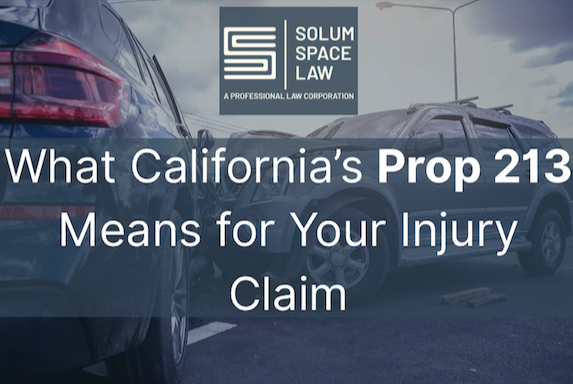What California’s Prop 213 Means for Your Injury Claim
The following article is provided by Solum Space Law, APC for general information only and should not be taken as legal advice. Every case is unique—if you have questions about protecting your rights after an injury in Southern California, call our office for a free consultation.
You were hit. The other driver was at fault. But now the insurance company says you may not be entitled to the full value of your injuries. In California, this may be due to a law known as Proposition 213.
What Is Prop 213?
Passed by California voters in 1996, Prop 213 was designed to encourage all drivers to maintain valid auto insurance. The goal: reduce the number of uninsured drivers on the road and ensure personal responsibility.
Under this law, if you were driving without valid insurance at the time of an accident, you may be barred from recovering certain types of damages, even if the other driver was 100% at fault.
Specifically, Prop 213 limits your ability to collect noneconomic damages, such as:
Pain and suffering
Emotional distress
Permanent disfigurement
Loss of enjoyment of life
You can still recover compensation for economic damages—including medical bills, lost wages, and property damage.
Who Might Be Affected?
Prop 213 applies to the driver of an uninsured vehicle, not passengers or third parties. However, it can affect a wide range of individuals, including:
Drivers with lapsed policies
People who borrowed an uninsured vehicle
Gig workers using their personal cars for work
Drivers not listed on the policy as a covered driver
Employees operating an employer-owned vehicle without commercial coverage
It may also impact undocumented drivers, who often face barriers to obtaining insurance.
Are There Any Exceptions?
Yes. California law carves out exceptions to Prop 213’s limits. You may still be eligible to pursue noneconomic damages if:
You were a passenger, not the driver
The accident occurred on private property
The at-fault driver was convicted of DUI
You were driving a company-owned vehicle during work-related duties
These exceptions are fact-specific and can be contested by insurers, so it’s important to consult with an attorney familiar with these nuances.
Why Legal Guidance Matters
Insurance companies often raise Prop 213 early in the claims process. They’ll scrutinize your policy history, registration status, and other technicalities. If the law doesn’t apply—or if an exception might—having legal representation can make all the difference.
An attorney can help ensure:
Prop 213 is correctly applied (or challenged if misapplied)
All possible exceptions are explored
Your economic damages are fully documented and pursued
Get Answers Before You Settle. Protect Your Claim Today.
At Solum Space Law, we know how to spot insurer overreach, how to invoke exceptions, and—when needed—how to go to court to get results. Whether you were uninsured or not, you deserve clarity.
Ready to discuss your case? Call (310) 405-0014 or complete our online form for a free, no-pressure case evaluation. Solum Space Law is here to bring order to the aftermath of your injury—building a strong case so you can focus on healing while we fight for the compensation you’re owed.
This blog is attorney advertising. The material below is presented by Solum Space Law, APC for educational purposes only and is not a substitute for tailored legal advice. Cases are fact-specific; if you have questions about the value of your claim, contact us for a complimentary consultation.

